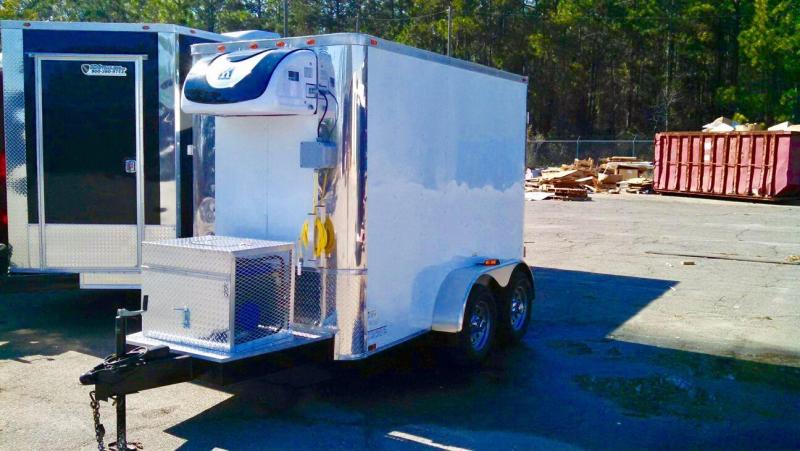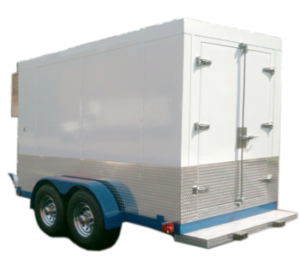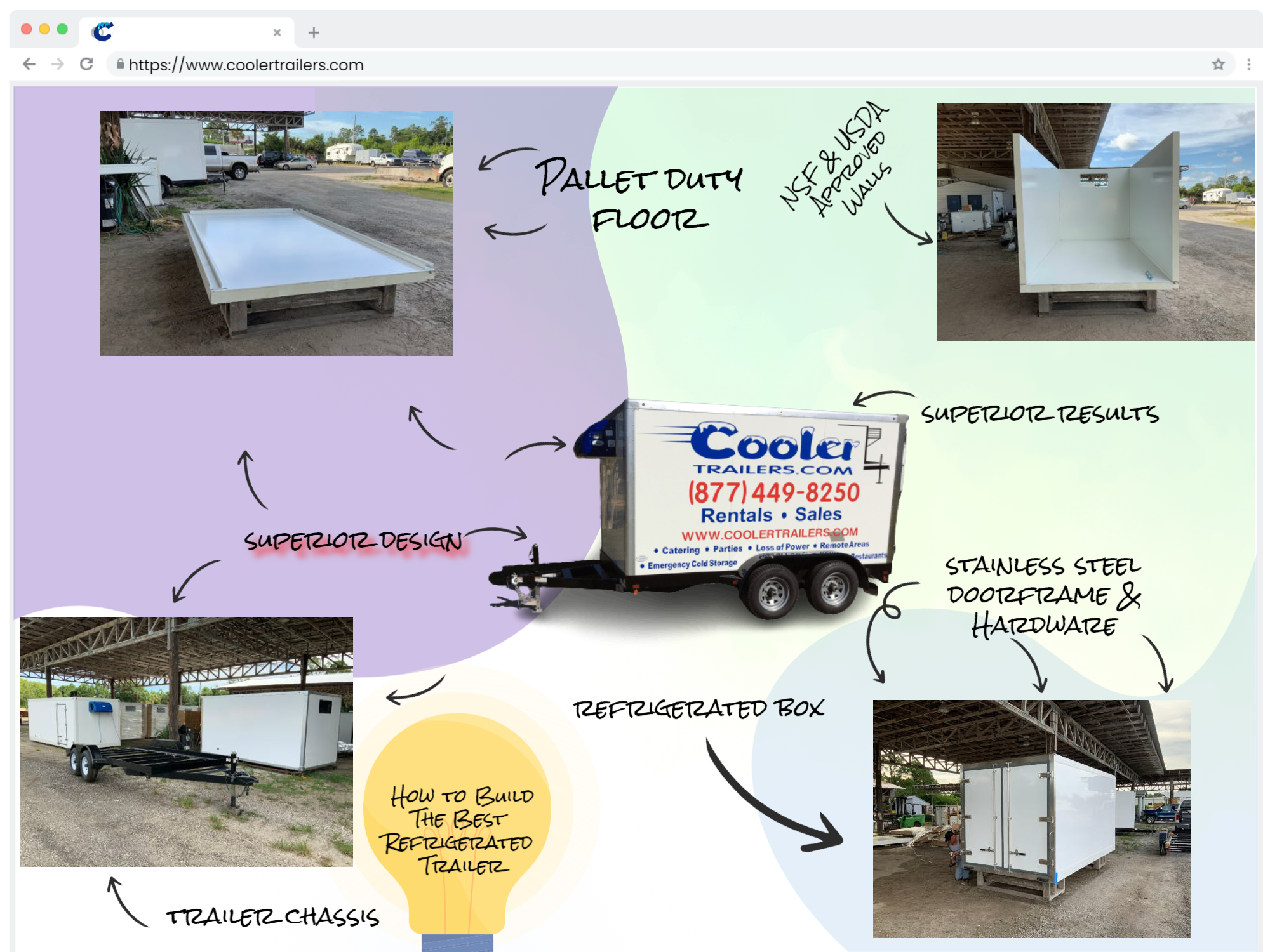Small Refrigerated Trailer for Sale: Customized for Efficiency, Ideal for Your Company
Small Refrigerated Trailer for Sale: Customized for Efficiency, Ideal for Your Company
Blog Article
Everything You Required to Learn About Refrigerated Trailers for Transport Success
In the world of transport and logistics, the function of cooled trailers is paramount in ensuring the efficient and safe delivery of temperature-sensitive goods. Comprehending the intricacies of chilled trailers, from their various kinds of refrigeration systems to the key upkeep methods that can prolong their lifespan and efficiency, is crucial for services seeking transportation success.
Importance of Refrigerated Trailers

Keeping certain temperature varieties is essential to avoid perishing, bacterial development, and degradation of products, which could cause considerable economic losses for representatives, vendors, and sellers. By using chilled trailers, businesses can expand the service life of their items and support stringent high quality criteria, inevitably enhancing consumer contentment and commitment.
Furthermore, chilled trailers enable business to increase their market reach by facilitating the transport of disposable products over cross countries. This capacity opens up opportunities for services to provide their products to remote places without compromising on freshness or safety. Essentially, cooled trailers are crucial assets in the transport market, working as the backbone of the cold chain logistics system.
Sorts Of Refrigeration Solutions

Vapor-compression refrigeration systems work by pressing refrigerant gas to raise its temperature level and stress, after that cooling it to get rid of heat and lower its temperature level prior to increasing it to take in and evaporate warm from the chilled area. This process is duplicated to preserve the preferred temperature inside the trailer.
On the other hand, absorption refrigeration systems make use of a heat resource to drive the refrigeration cycle. These systems are commonly utilized in situations where electric power is minimal or inaccessible. They use a combination of refrigerant and absorbent liquid to develop a continuous cycle of dissipation and absorption, effectively cooling down the inside of the trailer.
Selecting the best sort of refrigeration system for a refrigerated trailer relies on aspects such as the called for temperature array, energy effectiveness, and schedule of power sources. Each system has its advantages and limitations, so it is necessary to choose one of the most suitable option based on details transportation requirements.
Benefits of Making Use Of Refrigerated Trailers
Enhancing supply chain efficiency, refrigerated trailers play a crucial function in maintaining the quality of disposable items during transport. The advantages of using cooled trailers are multifaceted and vital for sectors relying on the risk-free distribution of temperature-sensitive items.
Secondly, refrigerated trailers use specific temperature control, making sure that items remain fresh and undamaged throughout the trip. This level of control is crucial for protecting the top quality, taste, and security of things such as fruits, vegetables, milk items, and pharmaceuticals (small refrigerated trailer for sale). By preserving the called for temperature array continually, cooled trailers help in reducing perishing and waste, conserving services significant prices in the future
Moreover, using cooled trailers enhances customer fulfillment by providing items in ideal condition, consequently developing depend on and loyalty. The reliability and efficiency of chilled trailers add to a smooth supply chain procedure, decreasing disturbances and making certain prompt distributions. Generally, the benefits of using refrigerated trailers are instrumental in achieving transport success for firms dealing with perishable items.
Upkeep Tips for Refrigerated Trailers
To make certain the ongoing efficiency and reliability of chilled trailers in the transport of disposable goods, implementing proper upkeep methods is discover this essential. Regularly inspecting the trailer's refrigeration device is necessary to identify any potential concerns prior to they escalate. This consists of inspecting the compressor, evaporator coils, and condenser for any indicators of wear or damages. Furthermore, maintaining the correct temperature level setups based on the details demands of the cargo being transported is critical. Tracking and calibrating temperature level controls consistently can assist prevent temperature level fluctuations that might compromise the high quality of the items. Keeping the trailer tidy both internally and on the surface is also crucial for optimal performance. Clearing up debris from the vents, making sure correct airflow, and checking the insulation for any type of leakages or gaps are all part of excellent maintenance techniques. Finally, organizing routine maintenance with licensed technicians can assist address any kind of underlying problems and keep the chilled trailer operating efficiently during transportation operations.
Sector Applications of Refrigerated Trailers
The application of chilled trailers plays a crucial role in preserving the stability weblink of temperature-sensitive products click to read more during transportation across different sectors. In the food market, refrigerated trailers are extensively used to transport perishable products such as fruits, vegetables, milk items, and meats. This guarantees that these goods continue to be risk-free and fresh for consumption from the factor of origin to the final location. Pharmaceutical firms likewise heavily count on cooled trailers to carry temperature-sensitive medications and vaccinations, where preserving specific temperature level ranges is critical to protecting the effectiveness of these items.


Additionally, the flower industry benefits greatly from cooled trailers to deliver plants and flowers over fars away without jeopardizing their top quality. Making use of cooled trailers prolongs to the medical care field as well, where medical supplies like organs for transplant or blood examples demand regulated temperatures during transit. In general, the adaptability of chilled trailers makes them indispensable across a variety of sectors where temperature level control is vital for item top quality and safety and security.
Final Thought
In final thought, refrigerated trailers play an essential role in the transportation of subject to spoiling items, guaranteeing their quality and top quality throughout transportation. The benefits of using chilled trailers prolong to different industries, from food and beverage to drugs.
In the world of transport and logistics, the role of cooled trailers is paramount in making sure the effective and secure distribution of temperature-sensitive goods.Additionally, chilled trailers enable business to broaden their market reach by facilitating the transportation of disposable products over lengthy ranges. Overall, the benefits of using cooled trailers are crucial in achieving transportation success for business dealing with disposable products.
To make certain the ongoing efficiency and reliability of refrigerated trailers in the transportation of perishable products, applying proper upkeep techniques is vital.The use of cooled trailers plays a crucial duty in keeping the integrity of temperature-sensitive items throughout transport across different industries.
Report this page